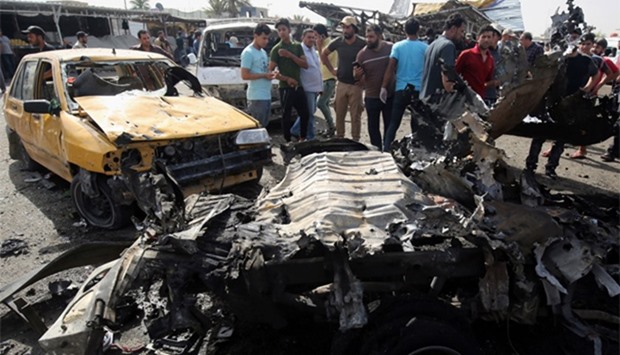It was the latest in six consecutive days of attacks in and around the Iraqi capital. Responsibility for most has been claimed by the extremist Islamic State group.
The deadliest attack hit the northern Shia district of al-Shaab, where a bomb blast and suicide explosion killed 44 civilians, according to witnesses and security and medical officials.
An initial bomb blast was followed by a female suicide bomber who blew herself up in a marketplace, they said.
Islamic State supporters on social media circulated a claim of responsibility saying a male suicide bomber had carried out the attack. The bomber had targeted members of Shia paramilitary forces, the statement claimed.
Dpa could not independently authenticate the claim, but it was similar to previous such claims issued by the extremist group.
Islamic State has frequently targeted crowded markets and restaurants in mainly Shia areas, as well as attacking Shia religious ceremonies and security forces.
Later on Tuesday, a car bomb hit a marketplace in the Shia Sadr City district in the east of the city, killing 18 people and injuring 57, according to police and witnesses.
Militiamen loyal to firebrand Shia cleric Moqtada al-Sadr sealed off the district after the attack and mounted a guard for government buildings, locals said.
Police said they also defused another car bomb in the area, where a marketplace bombing on Wednesday killed more than 60 people.
In the city's south-eastern al-Amin district, three people were killed and 15 injured in a car bomb attack.
Another six people were killed in two separate bomb attacks in the religiously mixed Yusufiyah and al-Rashid areas south of the city, police said.
More than 100 people have been killed in a wave of bomb and gun attacks in and around Baghdad over the past six days.
The attacks come as Iraqi security forces continue to make slow progress against Islamic State-held territory north and west of Baghdad.
Iraqi Prime Minister Haidar al-Abadi on Saturday charged that a political crisis in the capital was working to the extremist group's advantage.
The premier has been trying for months to form a more technocratic government in an effort to combat corruption and bad administration. But rival political parties, which have carved out fiefdoms in various ministries, have been blocking his moves.

